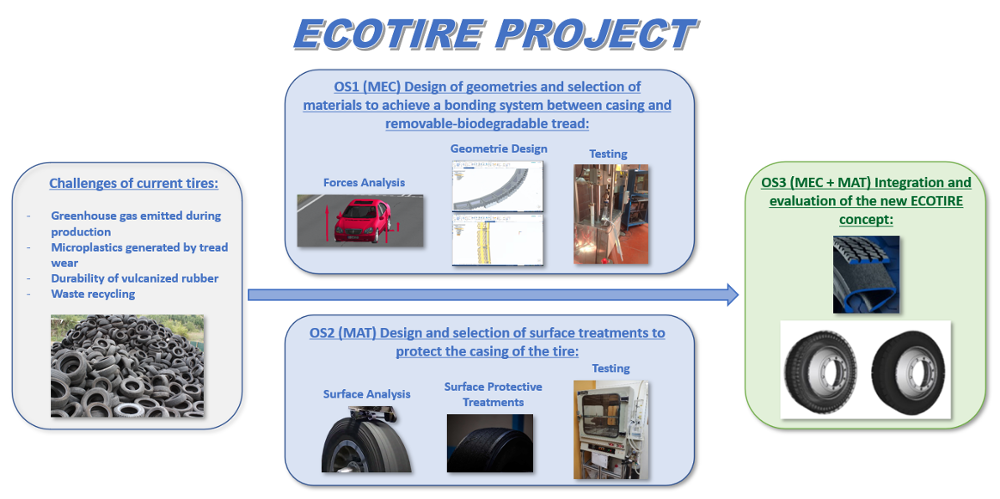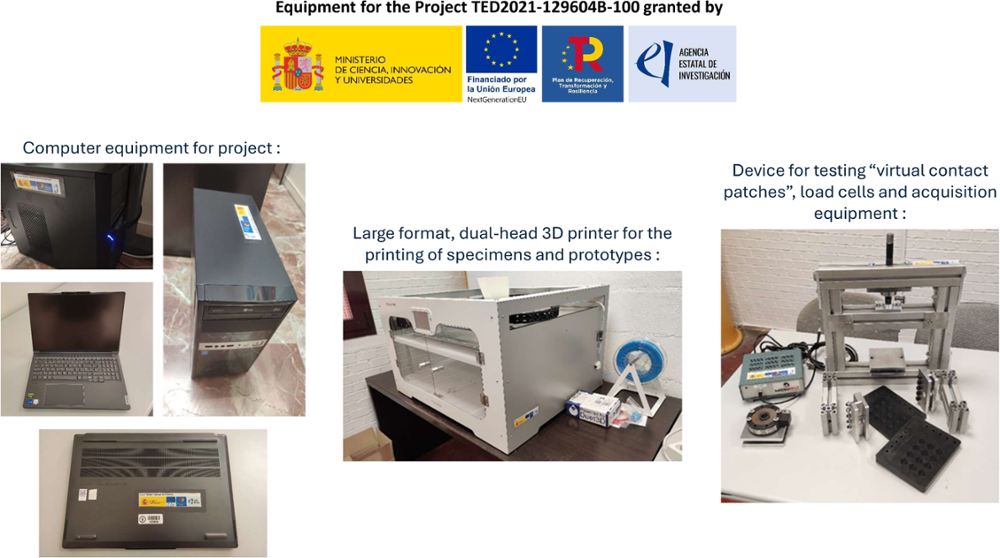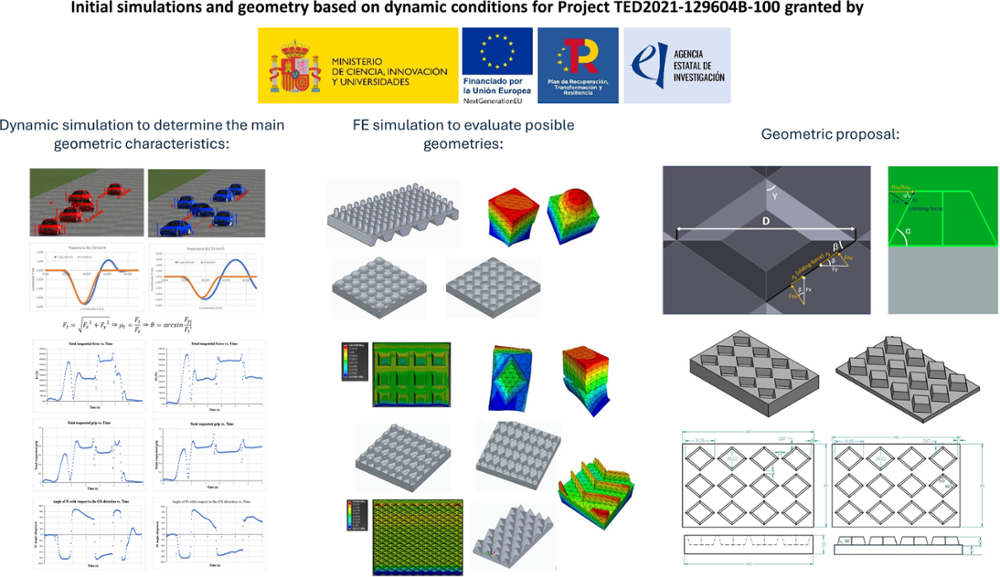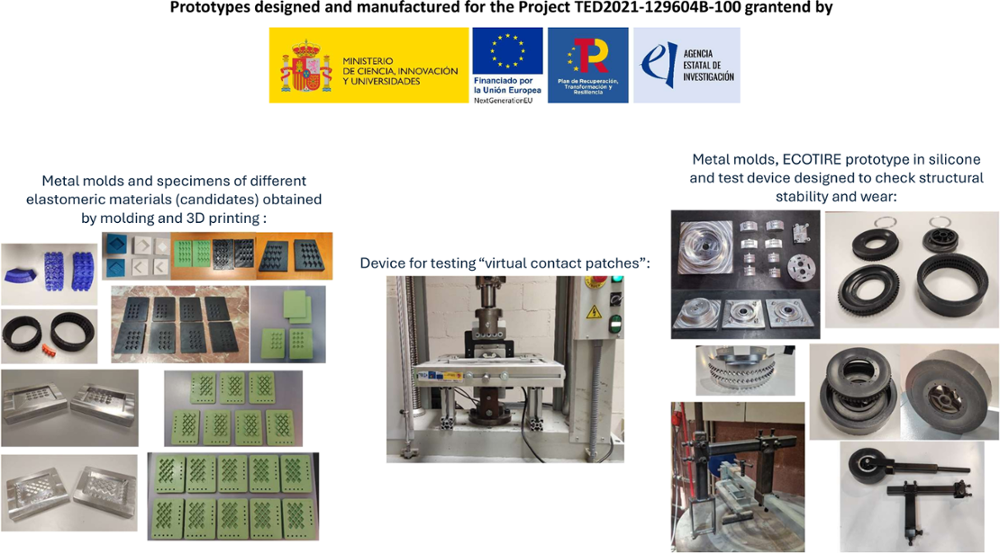NEW CONCEPT OF ECO-FRIENDLY TIRE BASED ON LONG LIFE CASING AND REMOVABLE GREEN TREAD (ECOTIRE)
- Inicio
- Investigación
- ADVANCED VEHICLE DYNAMICS AND MECHATRONIC SYSTEMS (VEDYMEC)
- Research projects
- NEW CONCEPT OF ECO-FRIENDLY TIRE BASED ON LONG LIFE CASING AND REMOVABLE GREEN TREAD (ECOTIRE)
The tire is a vital element in vehicle dynamics and road safety. Nevertheless, its manufacturing, use and recycling have a very relevant impact to the environment due to greenhouse gas emitted during their production, due to microplastics generated by tire tread wear (tires are the second-largest source of primary microplastic pollution in the ocean), and due to the durability of vulcanized rubber, which cannot easily be reshaped. In this regard, different studies have highlighted the importance of the environmental and health impact of tires. In the meantime, some of them propose improvements in tire design and manufacturing in order to reduce wear emissions of pollutants throughout its life cycle and through its end-of-life management. On other hand, the end-of-life management of the tires is an issue that is not well resolved at the present and some specific studies analyse the strategies from different countries and their implications with the sustainable development of smart cities. Although many of these studies and advances propose significant improvements, they are conditioned by certain restrictions imposed by current tires. For this reason, it seems necessary to study new tire concepts that facilitates the integration of these proposals and opens new options for the design and development of tires. In addition to studying new techniques for joining the casing and the tread to facilitate the use of new green treads proposals, it is necessary to improve the casing in terms of sustainability and/or increase its lifetime, through the use of new materials or surface treatments that reduce its degradation due to climate conditions and oxidation effects.
MAIN GOAL
The Main objective of the present project is the Design of a more ecological and sustainable tire, based on a removable tread with biodegradable characteristics and a reusable casing with extended lifetime.
SPECIFIC OBJECTIVES
- Specific objective 1: Design of geometries, materials and bonding systems to obtain a casing/tread joint that allows both parts to be separated and joined easily, with a mechanical behaviour equivalent to that of current tires.
- Specific objective 2: Design and selection of surface treatments (including surface activation and protective materials) that isolate and protect rubber composites.
- Specific objective 3: Integration and evaluation of solutions developed to increase the life cycle of the tire casing and suitable joints to replace treads made from sustainable materials with a low environmental impact.
RESEARCH TEAM
These goals require the participation of multi and inter-disciplinary teams, as well as collaboration with companies which are already conducting pioneering developments in these fields:
Mechanical Engineering Team (MEC): This research group, formed by researchers that belong to Mechanical Engineering Department, has an extensive experience in carrying out work related to tire modelling, vehicle dynamics, intelligent tires, mechanical fatigue and in the design of systems to improve vehicle behaviour. The profile of this research team allows a comprehensive approach to the study of the novel concept of removable tread with low environmental impact and to carry out studies of mechanical and tribological behaviour to validate its usability. The Principal Researcher (PR) of this group, Daniel García-Pozuelo Ramos (https://researchportal.uc3m.es/display/inv37469), has developed most of his research career in tire technologies, and is currently the more experienced Spanish researcher in the field of intelligent tires. His research in the field of tire design and modelling has resulted in 22 international articles (18 of them indexed) and more than 35 articles published in national and international congresses.
Material Science Team (MAT): This research group, formed by researchers from Materials Science and Engineering and Chemical Engineering, has extensive experience in work related to coatings and surface treatments for adhesion, including plasma treatments, polyurethane paints for silicones, and using silane and plasma treatments to promote adhesion of different materials while inhibiting corrosion, with wide experience in accelerated degradation tests. The PR of this group, Miguel Angel Martinez Casanova (https://researchportal.uc3m.es/display/inv18623) has been working for 25 years in the study of adhesive joints and coatings of all types of materials, including polymers and the study of their effect on durability under aggressive conditions. He is currently President of the Spanish group of Adhesion and Adhesives. In these 25 years, the research group has published more than 50 articles in indexed journals and presented more than 100 communications to international conferences and has 2 active patents.
More specifically, the researches involved in this project are:
- Daniel García-Pozuelo Ramos (MEC-Research Team, RP)
- Miguel Ángel Martínez Casanova (MAT-Research Team, RP)
- María Jesús López Boada (MEC-Research Team)
- Beatriz López Boada (MEC-Research Team)
- José Antonio Calvo Ramos (MEC-Research Team)
- Carolina Álvarez Caldas (MEC-Research Team)
- Ramón Alberto Gutiérrez Moizant (MEC-Research Team)
- Daniel Lavayen Farfan (MAT-Work Team)
- José Antonio Butenegro García (MAT-Work Team)
- Mohsen Bahrami (MAT-Work Team)
In addition, three researchers have been hired to be in charge of the project, contributing actively in ECOTIRE development:
- Farshad Afshari (PhD student, researcher in training)
- Juana Abenojar Buendía (PhD in Material Sciences and Engineering)
- Maider González González (MsC in Industrial Engineering, researcher in training)
Members of the research team, MEC and MAT, have experience collaborating in research areas which have resulted into previous competitive projects and articles. This research will count on the technical assistance as well as with the transfer of industrial property rights by Advantaria and MixTire Technologies, pioneering companies in research and development in these fields.
SCIENTIFIC AND TECHNICAL IMPACT
The scientific-technical impact of these results includes the identification of the global environmental impact of the tires (production, wear and tire waste) as well as the proposal of a new ECOTIRE concept which offers enormous potential for enhancing road safety and environmental impact. The project has a multi and inter-disciplinary character which is included in the areas: TRA-Transport and MEN-Materials for energy and environment.
Nationally, research and design of a new concept of eco-friendly tire based on long life casing and removable green tread connect with the Sustainable Mobility aspects of the Climate, Energy and Mobility strategic line included in the Spanish Strategy for Science, Technology and Innovation 2021/2027.
At a European level, the project results contribute to “vision zero” objective which has been set by the European Commission in the EU Road Safety Policy Framework 2021-2030 developing the synergies between safety and sustainability measures. Furthermore, the project contributions are included in the Climate, Energy and Mobility cluster of the Framework Program for Research and Innovation Horizon Europe - Global Challenges and European Industrial Competitiveness.
The project, which will be carried out until May 31, 2025 (completion date extended by six months by the funding agency), has enabled the design and manufacture of a "virtual contact patch" testing system that allows the study and evaluation of the various preselected materials, as well as the mechanical connection geometries for mounting the tread on the instrumented casing. Similarly, a scale prototype has been designed and manufactured to test the concept's usefulness. All this work has been accompanied by simulations that streamlined the design process and reduced costs.
This has resulted in the equipment, materials and prototypes shown below, as a representative example of the materials used and the work carried out in prototyping:
EXPECTED SOCIAL AND ECONOMIC BENEFITS
From an economic point of view, it should be noted that Spain has an important vehicular industry that can be interested in this type of research. At a strategic level, the research proposed in the Project will allow the national and European automobile companies to be even more competitive. The ECOTIRE concept, as this project aims, will contribute to further strengthen the Spanish automotive industry’s role as a leading innovator and lend a further boost to adjacent growth markets.
In terms of social impact, ECOTIRE contributes to improve the safety in road transport and to mitigate the environmental and health impact with the associated economic consequences. Tire manufacturing is an important source of greenhouse emissions, with tires being the second-largest source of primary microplastic pollution in the ocean, after synthetic textile and it is estimated that the global annual waste tires shall rise up to 1.2 billion tons by the end of 2030s. According to ASIRT (Association for Safe International Road Travel), approximately 1,3 million people die annually in car accidents and around 20-50 million suffer serious injuries. These accidents cause a global cost of 518 billion USD, which is between the 1-2% of GDP of a country. For that reason, Europe has set as objective to reduce to the half the deaths in car accidents by 2020 and totally by 2050. Nowadays, transport plays a fundamental economic and social role.
This project will contribute to the development of sustainable transport. For this reason, it is aligned with the achievement of certain Sustainable Development Goals (SDGs) proposed by the United Nations in its SDG2030 framework, with special emphasis on the following:
3. Good Health and Well-Being.
9. Industry, Innovation and Infrastructure.
11. Sustainable Cities and Communities.
12. Responsible consumption and production.
13. Climate action.
14. Life Below Water.
15. Life on Land
PUBLICATIONS
- Miguel Ángel Martínez; Juana Abenojar; Daniel García-Pozuelo. 2025. Effect of Plasma Treatment on Coating Adhesion and Tensile Strength in Uncoated and Coated Rubber Under Aging. Materials. MDPI. 18, pp.427-451. ISSN 1996-1944. JCR (3.1). https://doi.org/10.3390/ma18020427.
- Daniel García-Pozuelo; Farshad Afshari; Ramon Gutierrez-Moizant; Miguel A. Martínez. 2025. ECOTIRE: A New Concept of a Smart and Sustainable Tire Based on a Removable Tread. Applied Sciences. MDPI. 15-7, pp.3675-3696. ISSN 2076-3417. JCR (2.5). https://doi.org/10.3390/app15073675.
- J. Abenojar, M.A. Martínez, D. García-Pozuelo, M. Jesús López Boada, B. López Boada. Tire rubber versus silicone: a comparative study of wear resistance. The 13th International Conference on Fracture and Wear (FWW 2025), 29-31 de julio, Ghent, Belgium.
- D. García-Pozuelo Ramos (B) , F. Afshari, M.A. Martínez Casanova, F. Viadero-Monasterio, C. Álvarez-Caldas and J.A. Calvo Ramos. Designing a New Sustainable and Instrumented Tire: ECOTIRE. XIX European Congress on Mechanism Science EUCOMES 2024, Padua, Italia. (Presentación Oral, premio al mejor artículo de investigación del congreso)
- D. García-Pozuelo Ramos, M.A. Martínez Casanova, I. Requena Rodríguez, M.J. López Boada, B. López Boada. ECOTIRE: Primeras etapas de diseño de un nuevo concepto de neumático sostenible. CONAMA 2024, Congreso Nacional del Medio Ambiente, 2-5 de diciembre de 2024, IFEMA, Madrid.
- D. García-Pozuelo, F. Afshari, M.A. Martínez, D. Lavayen, F. Viadero-Monasterio, Maider González. Diseño de una unión mecánica entre carcasa y banda de rodadura para eco-neumáticos. XXV Congreso Nacional de Ingeniería Mecánica, 10-13 de junio de 2025, Santander.
- D. García-Pozuelo Ramos, M.A. Martínez Casanova, I. Requena Rodríguez, M. J. López Boada, B. López Boada, R. Gutiérrez Moizant, J. Abenojar-Buendía. Primeras fases de diseño de un neumático mixto-desmontable: ECOTIRE. XXIV Congreso Nacional de Ingeniería Mecánica, 25-27 de octubre de 2023, Las Palmas de Gran Canaria.
- J. Abenojar, M.A. Martínez, J. Butenegro, M. Bahrami, D. García-Pozuelo. Plasma treatment effects on the wettability and adhesion of commercial rubber. In Proceedings of the 7th International Conference on Structural Adhesive Bonding AB2023, 13-14 de Julio de 2023, Oporto, Portugal.
- M.A. Martínez Casanova, J. Abenojar Buendía, D. García-Pozuelo Ramos, I. Requena, J.A. Butenegro García, M. Bahrami. Estudios previos de adhesión y durabilidad de recubrimientos sobre caucho para neumáticos. XXII Congreso Internacional de Adhesión y Adhesivos, 16-17 de noviembre de 2023, Málaga.
PATENTS
- The project has resulted in the Utility Model: Tire with a less polluting tread and bonded using non-thermochemical methods. ES 1312633 U (page 33 of the BOPI). Registered: 24/01/2024. Granted: 24/01/2025.

This work is part of the R+D+i project: TED2021-129604B-100, funded by MCIU/AEI/10.13039 501100011033 and by the European Union NextGeneration EU PRTR.
Para más información:
daniel.garcia-pozuelo@uc3m.es






